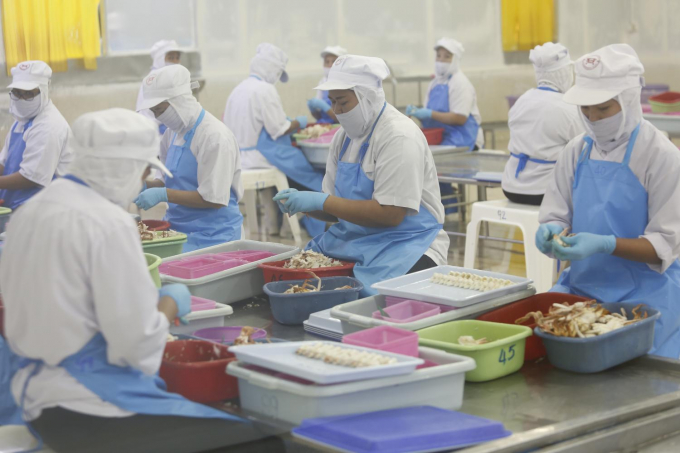November 28, 2025 | 02:48 GMT +7
November 28, 2025 | 02:48 GMT +7
Hotline: 0913.378.918
November 28, 2025 | 02:48 GMT +7
Hotline: 0913.378.918

Workers process seafood at one of the country's seafood processing plants. The agri-food industry accounted for one-quarter of the Thai economy and employed almost half of the workforce in 2019 prior to the pandemic. Photo: Pattarapong Chatpattarasill
Thailand's agri-food sector contracted by 6% or 228 billion baht last year with a corresponding decline of 8% or 730,000 people in its workforce, largely due to the effects of the Covid-19 pandemic, according to a report by Oxford Economics.
The nation's agri-food sector is facing the third most challenging -- after Phillippines and Indonesia -- recovery in a region of 10 countries, scoring 4.9 out of 10 in the report's Economy Recovery Matrix.
The country's food industry is especially vulnerable because of its dependence on tourism, which accounted for 9.5% of Thailand's total food consumption in 2019, however, international tourists are not expected to return to pre-pandemic levels until at least 2024.
Visit Limlurcha, chairman of Food Processing Industries Club of the Federation of Thai Industries, said this is a worrying scenario for the recovery of an industry that in 2019 accounted for one-quarter of the economy or 4 trillion baht, employed almost half of the workforce (17.9 million people), and contributed more than 708 billion baht in taxes.
"The report shows just how vital the agri-food sector is to Thailand's economy. While the sector's contribution shrank because of the pandemic, it contracted by less than the economy as a whole. The industry is fully committed to working with the government to ensure we play a critical role in post-pandemic recovery and that the agri-food sector remains a key driver of the economy," Mr Visit said.
According to Matt Kovac, executive director of Food Industry Asia (FIA) that commissioned the report, the government must recognise the current and future risks agri-food companies face before developing policies and implementing measures to drive post-pandemic recovery. Unintended policy consequences could easily scuttle the agri-food industry and Thailand's economic recovery plans, potentially leading to rising business and consumer costs and cause the closure of businesses and unemployment.
"Thailand's agri-food sector will face strong headwinds next year, including a slump in food and beverage demand as well as long-term challenges that will linger beyond the pandemic," he said. "Policymakers must consider such issues before introducing policies that could potentially hamper the agri-food sector's recovery given the scale of the industry's contribution to Thailand's economy and the job market."
The report notes that Thailand's sales tax rates are low when compared with global standards, which increases the risk of a sales tax hike as a way to finance public spending needed to support recovery. This puts the country most at risk in Asia from post-Covid fiscal adjustments, according to the report's Fiscal Risk Assessment Framework.
"Thailand's agri-food sector faces significant risks from any fiscal adjustment, especially given its vulnerable state due to the effects of the pandemic," said James Lambert, director of economic consulting in Asia for Oxford Economics. "It is important for any fiscal policy to be implemented after careful planning, design, and communication, which we have seen through the government's existing Covid-19 policies to support businesses, including those in the agri-food sector."
(BKP)

(VAN) A new study reveals how the simultaneous effects of ocean acidification, salinity and loss of oxygen are making the world more fragile.

(VAN) Hopes are growing that the creation of the first 3D turkey gut model could be a turning point in the battle against the virulent blackhead disease.

(VAN) Tyson, America’s biggest meat supplier, plans to shutter one of its largest beef processing plants as the industry continues to struggle with low cattle supplies and political pressure from Washington.

(VAN) New FAO study shows how digital solutions are empowering farmers and fishers to prevent losses and build resilient agrifood systems.

(VAN) Brazil's COP30 presidency pushed through a compromise climate deal on Saturday that would boost finance for poor nations coping with global warming but that omitted any mention of the fossil fuels driving it.

(VAN) Poultry farmers in the UK have been warned that they could face one of the worst winters yet for bird flu.

(VAN) Prices of main-crop paddy have risen sharply, with jasmine rice hitting 16,100 baht per tonne — the highest level in years.